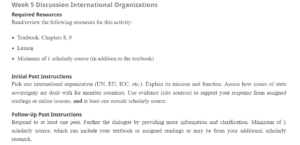The UN and State Sovereignty
Pick one international organization (UN, EU, ICC, etc.). Explain its mission and function. Assess how issues of state sovereignty are dealt with for member countries.
The United Nations was created in 1945 to help restore international peace and stability after countries experienced the bitter taste of the two world wars. Nation-states joined the organization as signatories to help keep the international system stable. It is, therefore, the UN’s role and functionality to address any matters that undermine the peace and stability of the international community.
The realism theory holds that a nation-state is a sovereign actor in the international system and that it holds territorial integrity (Whitman, 2020). This means that any external intervention would violate the state’s independence to address its domestic affairs and to maintain its territorial integrity. However, over the years, there has been a constant controversial debate about what level of sovereignty a nation-state can assume.
More often than not, matters of sovereignty have come into the limelight when human rights are involved. Nation-states are made up of human beings all over the world. Part of the responsibility of nation-states as sovereign actors within the international system is to protect their citizens against internal and external aggression or violation. However, states have flouted their basic responsibilities and covered their actions under the sovereignty umbrella.
The former UN Secretary-General Boutros Boutros-Ghali and his successor, Kofi Annan, declared that state sovereignty is no longer exclusive and absolute and can be overridden and circumscribed under specific circumstances (Ayoob, 2002). Such circumstances include matters pertaining to human rights, especially after the failure of the UN to intervene in the Rwandan genocide. Its reluctance to intervene resulted in myriads of massacres in Rwanda that left the world in horrific shock. The UN Security Council got its majority of support from powerful nation-states like the U.S. and France. However, the U.S. was also unwilling to support the UN in its intervention because of its grievances with one of the African states, Somalia, a source of terrorists that attacked the U.S.
Based on this experience, the UN strives to bring all states to the table to help maintain stability and prevent violations of intrinsic human rights such as those that happened in the U.S. Following the shortcomings of sovereignty; the 1990s saw a new redefinition of sovereignty to include responsibility as part of sovereignty. According to Ayoob (2002), such responsibility is owed by a nation-state to its citizens, the international community, and its institutions. Therefore, the state has to behave towards its people in a manner that meets not just the approval of the people but also of international organizations like the UN and other states.
References
Ayoob, M. (2002). Humanitarian intervention and state sovereignty. The international journal of human rights, 6(1), 81-102.
Whitman Cobb, W. N. (2020). Political Science Today (1st ed.). Washington, DC: Sage, CQ Press
ORDER A PLAGIARISM-FREE PAPER HERE
We’ll write everything from scratch
Question 
Week 5 Discussion International Organizations
Required Resources
Read/review the following resources for this activity:

The UN and State Sovereignty
- Textbook: Chapters 8, 9
- Lesson
- Minimum of 1 scholarly source (in addition to the textbook)
Initial Post Instructions
Pick one international organization (UN, EU, ICC, etc.). Explain its mission and function. Assess how issues of state sovereignty are dealt with for member countries. Use evidence (cite sources) to support your response from assigned readings or online lessons, and at least one outside scholarly source.
Follow-Up Post Instructions
Respond to at least one peer. Further the dialogue by providing more information and clarification. Minimum of 1 scholarly source, which can include your textbook or assigned readings or may be from your additional scholarly research.
Writing Requirements
- Minimum of 2 posts (1 initial & 1 follow-up)
- Minimum of 2 sources cited (assigned readings/online lessons and an outside scholarly source)
- APA format for in-text citations and list of references
Grading
This activity will be graded using the Discussion Grading Rubric. Please review the following link:
- Link (webpage): Discussion Guidelines
Course Outcomes (CO): 3, 5
Due Date for Initial Post: By 11:59 p.m. MT Recommended by Wednesday
Due Date for Follow-Up Posts: By 11:59 p.m. MT on Sunday
Posts must be on two separate days.
Search entries or author Filter replies by unreadUnread Collapse replies Expand replies